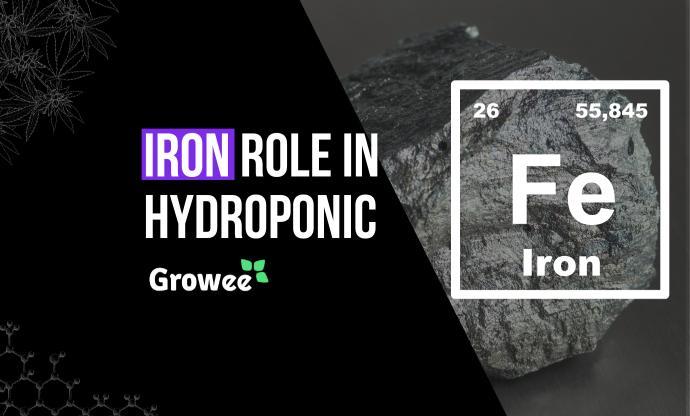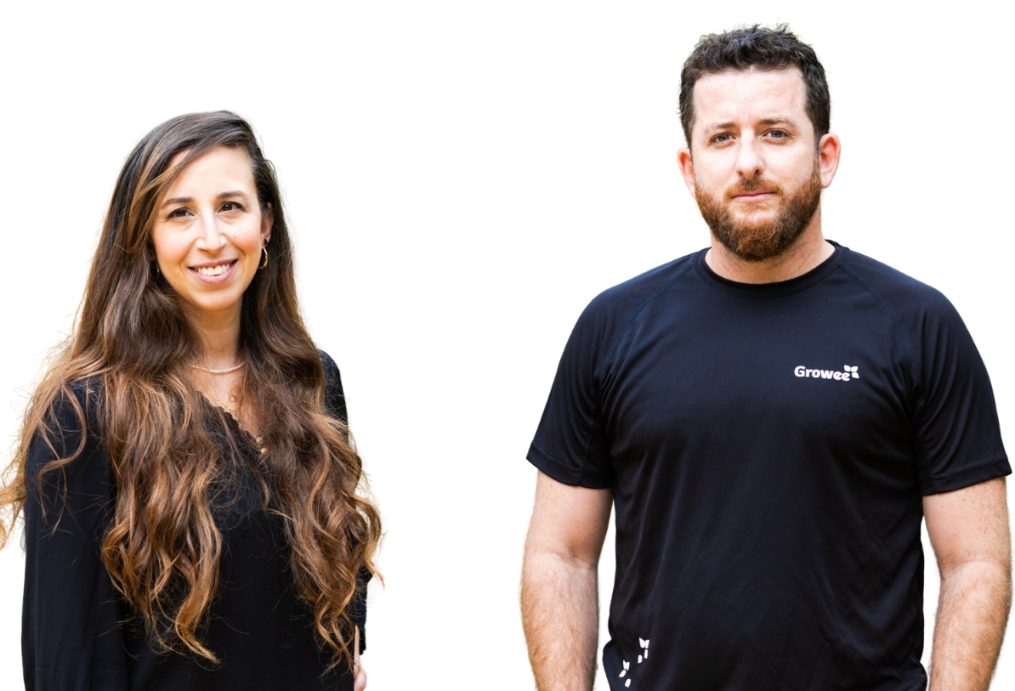If you are growing hydroponic plants, an issue that you might experience is an iron deficiency.
Although iron is not one of the big three nutrients that hydroponic cannabis and other hydroponically grown plants require, it is an important element nonetheless.
If your plants have an iron deficiency, then they’re in serious trouble. Today, we’re going to determine how to recognize, treat, and prevent iron deficiencies in hydroponic plants.
What Is Iron (Micro Element)?
Iron (fe) is vital for plants, helping them with important tasks like making chlorophyll and aiding enzyme functions. When plants grow in soilless environments like hydroponics, iron needs to be added to the nutrient solution.
Although its iron ore production is not as extensive as some other countries, there are some active iron mines in the US, Notable iron mining areas in the U.S. include the Mesabi Range in Minnesota, the Iron Range in Michigan, and parts of Utah, Additionally, smaller iron mining operations exist in other states like Wisconsin and Missouri.
See How Growee Can Save You Time By Automating Your Plants Feeding
Water pH – Automated pH Up and Down Control
Nutrients Mixing – Automated Nutrient Dosing with Target EC / PPM Control.
Control From Anywhere – WiFi Connection and mobile App
Understanding Hydroponics Fertilizers Label – What is Fe?
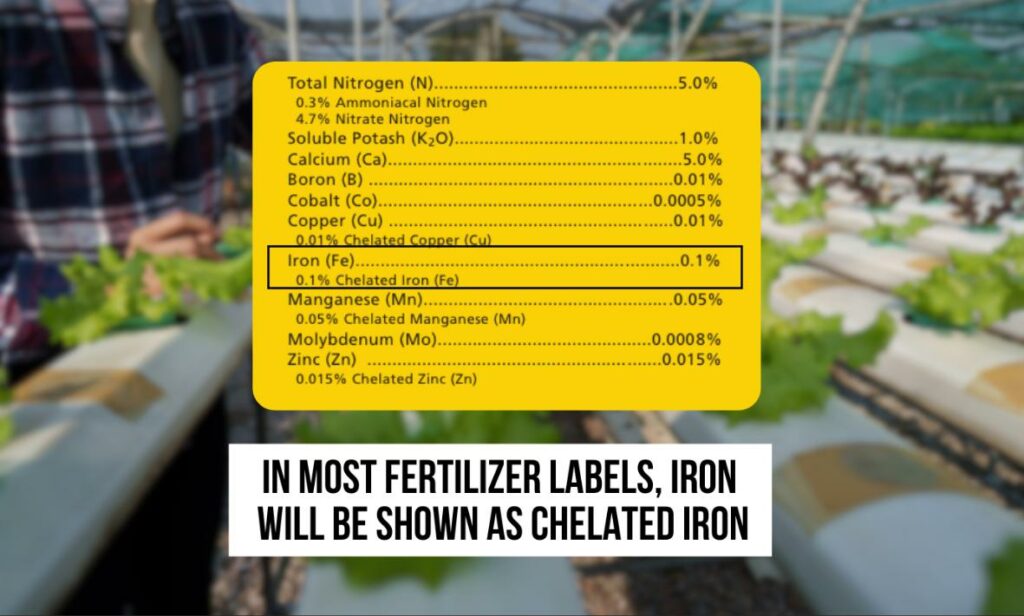
In most Hydroponis fertilizers labels, Iron (Fe) will be shown as Chelated iron.
Chelated iron is a form of iron that has been chemically bound to a chelating agent, typically an organic molecule This helps keep the minerals in a form that plants can easily absorb.
Why Is Iron Important for Plant Health?
Iron is important for plant health for a number of reasons. For instance, proteins that contain iron are important to help plants engage in both photosynthesis and respiration. Plants have to engage in photosynthesis in order to turn the food you give them into glucose, which is the fuel they need to grow.
Iron is however also important for a number of other reasons, including chlorophyll synthesis. Chlorophyll is the substance in plants that gives it the green color, but it has a much more important function than that, being able to absorb light. Without chlorophyll to absorb light, plants cannot engage in photosynthesis, and it all starts with iron.
Iron is also a vital part of the enzyme systems of plants, which includes functions such as lignin formation, nitrogen reduction and fixation, and energy transfer as well. Iron is even important for helping to boost the immune system of plants to make them more resilient to diseases.
What Causes Plant Iron Deficiency?
Iron deficiency in plants may be due to a variety of causes, including the following.
- The most common cause of an iron deficiency in hydroponic plants is if you don’t provide them with adequate nutrients to begin with. The food you give to your plants should contain some iron.
- The next reason why plants may suffer from an iron deficiency is due to factors that result in poor aeration. Poor aeration often results in poor root function, which means that plants can’t properly absorb nutrients.
- Another reason why your plants might not be getting enough iron is due to very high pH levels. Extremely high pH levels make iron much less soluble, which means that plants can’t absorb it as easily.
- On that note, if there are high levels of phosphorus present, it can cause the iron to become biologically unavailable to your hydroponic plants, even though it may be present in abundant quantities.
Symptoms of Iron Deficiency in Hydroponic-Grown Plants
If you aren’t sure whether or not your plants have an iron deficiency, there are some telltale symptoms to pay attention to.
Interveinal Chlorosis
The first symptom that you might see in hydroponic plants with an iron deficiency is known as interveinal chlorosis. This is when the leaves turn yellow in between the veins, but the veins stay green. This happens because iron may become immobile within plants, and therefore doesn’t get transported from the older to the newer leaves.
Brown Leaves
One of the most common signs of an iron deficiency in hydroponic plants, especially in extreme cases, is brown leaves. This is especially the case as far as the tips of the leaves are concerned.
Slow and Stunted Growth
If you notice that your hydroponic plants are small, not growing well, and stunted, then it could be a result of an iron deficiency. A plant cannot properly engage in the processes it needs to grow if it does not get enough iron, mainly photosynthesis and respiration.
Real-World Research: Spotting Iron Deficiency in Cannabis
According to a study by Paul Cockson and his team at North Carolina State University, one of the telltale signs of iron deficiency is interveinal chlorosis, where the leaves turn yellow between the veins while the veins themselves stay green.
This yellowing starts in the upper leaves, particularly around the growing tips. The study notes, “Symptoms of Fe stress began as a slight marginal yellowing of the leaflets” and can quickly spread if not managed properly. While the initial biomass might not take a huge hit, the deficiency can severely affect the plant’s overall health and its ability to photosynthesize efficiently.
The researchers emphasize the importance of early detection and correction to maintain healthy growth and optimize yield. So, if you see your cannabis plants showing these symptoms, it’s a good idea to check for iron levels and adjust your nutrient mix accordingly.
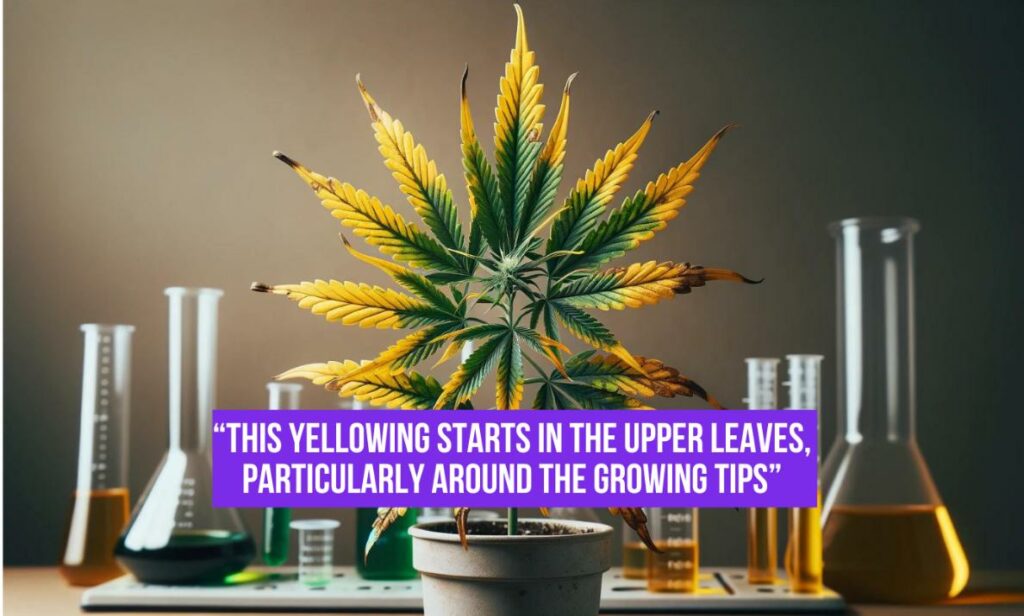
How to Treat Iron Deficiency?
The best way to treat an iron deficiency is of course to provide your hydroponic plants with more iron. A really easy way to do this is with a foliar spray, which makes for a good short-term solution, although it realistically will not solve the underlying cause.
However, how to add more iron into your watering solution is something we’ll discuss in greater detail below, but what it really comes down to is having a proper nutrient solution.
That said, how to treat an iron deficiency depends on the underlying cause. For instance, if the iron deficiency in your hydroponic plants is caused by an unideal PH level, the solution is to adjust the PH level to within the ideal range, which is usually between 5.5 and 6.5.
To ensure that the roots of your hydroponic plants can properly absorb iron and other nutrients, you need to make sure that the growing medium is well-drained and aerated.
How To Add Iron To Your Hydroponic Water Solutions
If you are a small-scale grower, micro-farm, or home grower, we recommend using pre-mixed nutrients that are suitable for hydroponics.
You can find well-known brands in any hydroponics store. These brands have created a series of suitable products that meet the plants’ needs and contain all the necessary micro and macro elements. For example, a dedicated nutrient solution that contains microelements like iron.
Following the feeding chart is a good starting point. You can make your own custom changes as you move forward and gain experience in hydroponics. For mixing the nutrients properly, you can use the Growee smart dosing system. This system will add the nutrients according to your custom feeding chart and keep the EC/PPM within the desired range.
Preventing Plant Iron Deficiency
As long as you know what you’re doing, preventing an iron deficiency in hydroponic plants is not overly difficult.
- Ensure that pH levels remain stable between 5.5 and 6.5, as this allows for proper absorption of iron.
- Make sure that you are providing your hydroponic plants with a balanced nutrient solution that contains chelated iron.
- Ensuring that your hydroponic system provides the roots with proper aeration and drainage can also help maintain ideal iron levels.
- Regularly test your nutrient solution and check for high phosphorus levels. Excessive phosphorus can prevent a plant from intaking enough iron.
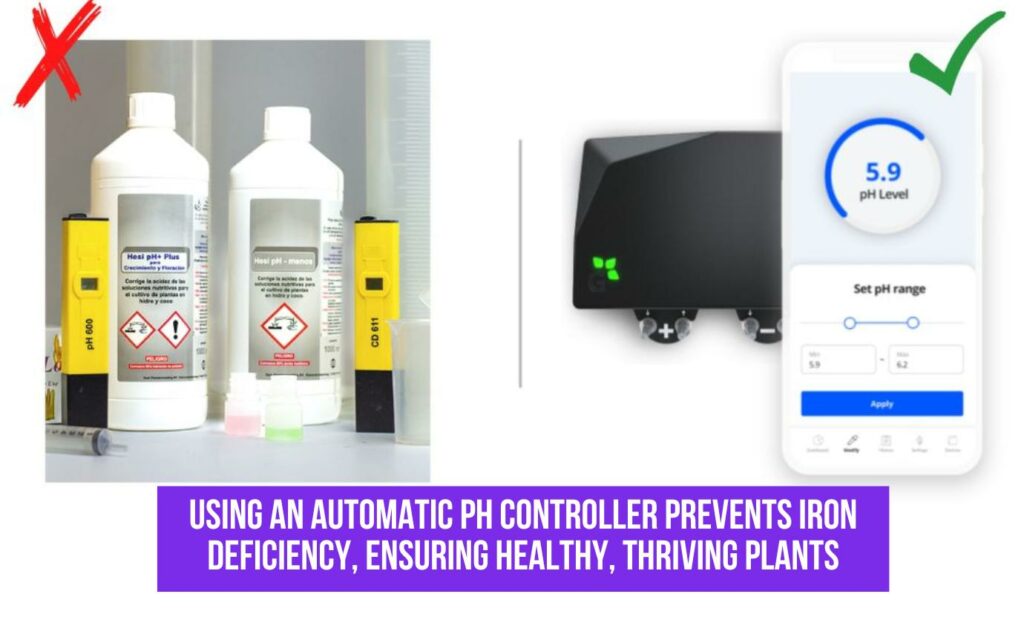
How Do Growee Products Prevent Iron Deficiency?
Growee products like the Growee Pro Combo help to prevent iron deficiency by providing you with constant and real-time updates of EC or nutrient levels.
Even better is that there is a dedicated hydroponics app that you can use on your smartphone, to receive real-time updates no matter where you are.
What also stands out is that this system automatically tests for and adjusts pH levels, therefore keeping the pH within an ideal range, and ultimately allowing hydroponic plants to absorb iron as needed.
Keep in mind that the Growee Pro Combo is also able to automatically adjust nutrient output based on its readings.
Solving Iron Deficiency in Hydroponic Plants
At the end of the day, as long as you maintain ideal pH levels, make sure that the roots of your plants are healthy, and provide them with a well-balanced nutrient solution, you should be able to prevent a nutrient deficiency like an iron deficiency from happening in the first place. All that said, the line of hydroponic equipment from Growee certainly makes things easier!
FAQ
What plants are most affected by iron deficiency?
Garden plants like peppers and tomatoes, as well as blueberries are particularly susceptible to our deficiencies, as are rhododendrons, azaleas, and cannabis plants.
What happens when plants lack iron?
A lack of iron in hydroponic plants can lead to the yellowing of the leaves, stunted growth, and in extreme cases even death.
How can I avoid iron deficiency?
To avoid an iron deficiency, make sure that the growing medium is of the right pH level, that you’re providing your plants with enough nutrients, that they aren’t getting too much phosphorus, and that their roots can breathe properly.
Which signs indicate that a plant is lacking iron?
Stunted growth, the yellowing of the leaves in between the veins, and the Browning of the tips of leaves are all indications that a plant is lacking iron.
How quickly will my plants recover from iron deficiency?
If properly treated, an iron deficiency should resolve itself within a few days to few weeks after starting the treatment.
How do you fix iron deficiency in hydroponics?
To fix an iron deficiency in hydroponics, add more chelated iron to the water solution, adjust the pH to the ideal range (5.5 to 6.5), and use a foliar spray.
What is the best way to correct iron deficiency in plants?
The best way to correct an iron deficiency in plants is by using chelated iron.

